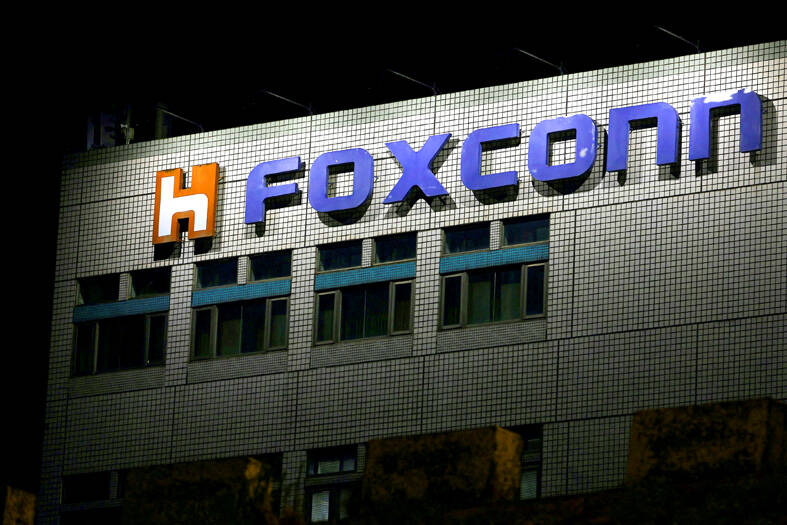Hon Hai Precision Industry Co’s (鴻海精密) second-quarter sales outperformed analysts’ rising expectations on the strength of the company’s growing artificial-intelligence (AI) server business.
The iPhone assembler, also known as Foxconn (富士康), yesterday said that its revenue last month was NT$490.7 billion (US$15.1 billion), making for a total of NT$1.55 trillion for the quarter, up 19 percent. An average of analyst estimates pointed to a 13.8 percent rise, with expectations growing after Hon Hai said a month earlier that it expected the AI business to help it beat estimates for the quarter.
Hon Hai said revenue last quarter marked the strongest second quarter performance in the company’s history and greatly exceeded its own expectations.

Photo: Ann Wang, Reuters
Hon Hai’s shares have more than doubled this year and hit new highs last month on hopes the company can capitalize on the AI boom. It went through a tough year last year, as sales shrank due to moribund demand for the consumer electronics it assembles. However, the company rapidly added revenue from orders for AI servers and other data center gear, diversifying away from the smartphone business.
“The third quarter is expected to generate growth compared to the second quarter and the same period last year,” Hon Hai said in a statement accompanying its monthly sales release.
Excitement about Hon Hai’s role in the AI hardware market helped its shares breach the NT$200 level that founder Terry Gou (郭台銘) had pledged to achieve in 2016. The AI boom has also brought much focus to Taiwan this year, making the latest Computex event a huge success, with CEOs from the biggest US chipmakers all coming to woo key suppliers and data center equipment makers.

Nvidia Corp’s demand for advanced packaging from Taiwan Semiconductor Manufacturing Co (TSMC, 台積電) remains strong though the kind of technology it needs is changing, Nvidia CEO Jensen Huang (黃仁勳) said yesterday, after he was asked whether the company was cutting orders. Nvidia’s most advanced artificial intelligence (AI) chip, Blackwell, consists of multiple chips glued together using a complex chip-on-wafer-on-substrate (CoWoS) advanced packaging technology offered by TSMC, Nvidia’s main contract chipmaker. “As we move into Blackwell, we will use largely CoWoS-L. Of course, we’re still manufacturing Hopper, and Hopper will use CowoS-S. We will also transition the CoWoS-S capacity to CoWos-L,” Huang said

Nvidia Corp CEO Jensen Huang (黃仁勳) is expected to miss the inauguration of US president-elect Donald Trump on Monday, bucking a trend among high-profile US technology leaders. Huang is visiting East Asia this week, as he typically does around the time of the Lunar New Year, a person familiar with the situation said. He has never previously attended a US presidential inauguration, said the person, who asked not to be identified, because the plans have not been announced. That makes Nvidia an exception among the most valuable technology companies, most of which are sending cofounders or CEOs to the event. That includes

INDUSTRY LEADER: TSMC aims to continue outperforming the industry’s growth and makes 2025 another strong growth year, chairman and CEO C.C. Wei says Taiwan Semiconductor Manufacturing Co (TSMC, 台積電), a major chip supplier to Nvidia Corp and Apple Inc, yesterday said it aims to grow revenue by about 25 percent this year, driven by robust demand for artificial intelligence (AI) chips. That means TSMC would continue to outpace the foundry industry’s 10 percent annual growth this year based on the chipmaker’s estimate. The chipmaker expects revenue from AI-related chips to double this year, extending a three-fold increase last year. The growth would quicken over the next five years at a compound annual growth rate of 45 percent, fueled by strong demand for the high-performance computing

TARIFF TRADE-OFF: Machinery exports to China dropped after Beijing ended its tariff reductions in June, while potential new tariffs fueled ‘front-loaded’ orders to the US The nation’s machinery exports to the US amounted to US$7.19 billion last year, surpassing the US$6.86 billion to China to become the largest export destination for the local machinery industry, the Taiwan Association of Machinery Industry (TAMI, 台灣機械公會) said in a report on Jan. 10. It came as some manufacturers brought forward or “front-loaded” US-bound shipments as required by customers ahead of potential tariffs imposed by the new US administration, the association said. During his campaign, US president-elect Donald Trump threatened tariffs of as high as 60 percent on Chinese goods and 10 percent to 20 percent on imports from other countries.